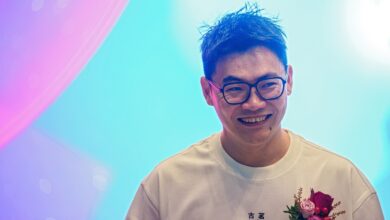K-pop’s first North Korean defector group has big dreams — to perform in their homeland despite heavy bans; read

In recent years, South Korean K-pop idols have amassed millions of fans worldwide, gaining influence that extends far beyond music; while many leverage their fame to promote albums, merch and endorsements, Yu Hyuk and Kim Seok, members of breakout group 1Verse (pronounced “universe”) have a different vision, one that is deeply personal. The life they live now, full of music and dance is a far cry from the one they left behind. Hyuk (C) had to learn singing and dancing from scratch Originally from North Korea, Yu Hyuk (25) and Kim Seok (24) defected at a young age and are now members of 1Verse, a uniquely global K-pop that also includes Aito from Japan, as well as Kenny and Nathan, who are of Asian-American descent. While the K-pop industry is saturated with groups fighting for attention, 1Verse stands out for its dinctive composition, becoming the first Korean pop boy band formed with North Korean defectors. Hyuk (top), Aito (bottom left), Seok (middle), and Kenny (right) Origin storyHyuk’s, path to stardom began in the seaside village of Kyongsong County, where he was raised his father and grandmother after his parents’ separation. His mother fled to South Korea when he was only four years old and eventually Hyuk joined her after his father refused to provide for him, and his grandmother grew too old to work. The journey from North Korea to South Korea was perilous, spanning several countries on an undisclosed route. It took months, but Hyuk eventually arrived in the South, where he faced the challenge of adjusting to a fiercely competitive education system despite having barely completed primary school. Though Hyuk struggled academically, he found solace in writing. He began composing short poems reflecting on his past life in North Korea. His music, a form of self-expression and catharsis, became his anchor, helping him deal with his loneliness and longing for his father. His rap song Ordinary Person, which touches on his feelings of isolation, includes the line, “the loneliest of the loners” — a phrase that encapsulates his emotional journey. Hyuk went on to graduate from high school at the age of 20 and worked part-time in restaurants and factories to support himself. On the other hand, Seok, who is also originally from North Korea, had a different experience. His background was more privileged since he lived near the Chinese border, where he had access to K-pop and K-drama through smuggled USBs and SD cards. While his path to the South was smoother than Hyuk’s, he, too, faced significant challenges in adjusting to life in a new country. Both Hyuk and Seok were scouted Michelle Cho, a former producer at SM Entertainment — the agency behind K-pop giants like EXO and Super Junior. Cho recognized their potential and recruited them into her agency, Singing Beetle, which was tasked with moulding them into K-pop idols. She described both boys as “blank canvases,” acknowledging that they had no prior exposure to pop culture and were completely new to music and dance. Despite their lack of experience, Hyuk and Seok’s determination impressed Cho. They pushed themselves through gruelling practice sessions, often to the point of exhaustion. Cho admits she was initially concerned they were “overdoing it,” but their sheer resilience kept them moving forward. The big dreamHyuk has one major dream — to perform in North Korea, which is under strict authoritarian rule and where music like his is banned. While human rights activs regularly send leaflets and USBs containing South Korean culture via balloons and bottles to North Korea, Hyuk’s dream of seeing K-pop reach his homeland might honestly be a long shot. As an academic specialising in North Korean media and music, Ha Seung-hee of Dongguk University believes that Hyuk’s success would cause a “stir” in North Korea. “If a North Korean defector openly embraced their identity and went on to become a world-class activ, I think that would create a huge impact in the North,” Ha says. Hyuk’s motivation, however, is not just about music or activism — it’s about inspiring others. “Many defectors see an insurmountable gap between themselves and K-pop idols. It is hardly a career option for us,” Hyuk says. “So if I succeed, other defectors might be encouraged to dream bigger.” In a society where defectors are often marginalised, Hyuk hopes that his success will offer others the hope that they too can achieve the impossible. The boys’ journey and the story of 1Verse is a powerful reminder of the transformative power of music. While K-pop may be banned in North Korea, Hyuk’s dream is a testament to the enduring spirit of those who strive to break free from the constraints of their circumstances — and to prove that dreams, no matter how big, can sometimes become a reality.







